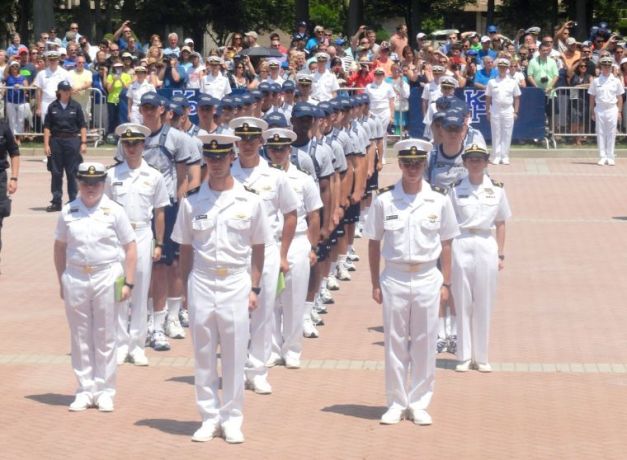Lawrence Balsamo Jr. stared at the reflection of his full head of dirty blonde hair, taking a few final seconds to appraise his appearance.
Sitting in a barber chair at the U.S. Merchant Marine Academy at Kings Point on Wednesday, he gave a small smile as a razor was brought to his head, bringing him one step closer in his transformation from recent high school graduate to plebe candidate.
As the final pieces of hair fell to the floor, the Island Park resident kept his eyes on the mirror and proudly touched his freshly-shaven head as he stood to join his fellow “plebe” candidates on the first day of their Indoctrination, also known as INDOC, on the path to becoming midshipmen.
“This has been his lifelong dream to make it here,” Balsamo’s father, Lawrence Sr., said. “This is what he wanted, and I guess not many people get to realize that dream, and he did it at 18 years old.”
Balsamo was one of 252 members of the Class of 2018 who took their first steps toward serving America on Wednesday as they said goodbye to their families and began the academy’s 20-day academic, military and physical-training program.
The plebe candidates were selected from 2,200 students applicants and hail from 46 states and four foreign countries, including Malaysia, Romania, Panama and the Republic of Korea, which USMMA officials said is one of the most diverse classes ever to enter the Academy.
“It is a program that will make these high achievers the leader of character that our nation needs,” said Rear Admiral James A. Helis, addressing the candidates’ parents. “It’s going to be a tough four years. These next few weeks may be the toughest weeks they may experience.”
The incoming plebe class scored a mean of 631.50 on the SAT’s critical reading section and a 651.63 in math, USMMA officials said.
About one-fifth of the students will serve the academy’s band company, which performs at a variety of important national events, while 123 plebes were recruited for athletics, officials said.
“They have already shown that they are far above their peers and that is why they are here today,” Academic Dean Shashi N. Kumar told parents.
The class also includes the highest percentage of women and minorities ever to enter the academy, Helis said, with female enrollment at 18.6 percent and non-Caucasian students making up 27.7 percent of the incoming class.
Upon entering the academy’s O’Hara Hall on Wednesday, the plebes were weighed and measured, completed registration, received uniforms, learned essential commands and how to salute, and had their heads shaved.
During the final part of Indoctrination Day, dressed in uniforms and heads freshly shaved, plebe candidates joined the five companies to which they were assigned and stood at attention at Barney Square.
Parents watched as Acting Maritime Administrator Paul N. Jaenichen addressed the academy’s five plebe companies for the first time.
Helis said that for many of the new plebes, training will mark the first time in their lives that they will have been exposed to an environment in which they will take orders, work alongside others, “clean their own rooms and do their own laundry without much supervision.”
Plebes will choose from one of six academic majors – including marine transportation, maritime logistics and security, marine engineering, marine engineering systems, systems engineering and maritime and shipyard management – at the end of their first trimester. They must also spend one full year at sea as part of their requirements.
At the completion of the academy’s four-year program, midshipmen receive a Bachelor of Science degree, the training necessary for licensing as a merchant marine officer and the skills associated with enlisting as a reserve in the United States military.
Upon graduation, midshipmen must fulfill a service obligation to complete five years of active military duty or sail as a U.S. merchant marine for five years while serving for eight years as a reserve.
“What some of them are going to see is that they are really going to struggle,” Helis said. “We are going to stretch them, we are going to push them, and we are going to require them to expand their horizons. And at some point they are going to struggle.”
But Helis reassured parents that he is confident the students would grow into strong sailors and mature young men and women in the coming years.
“They are here,” he said, “because they have what it takes to get through.”

